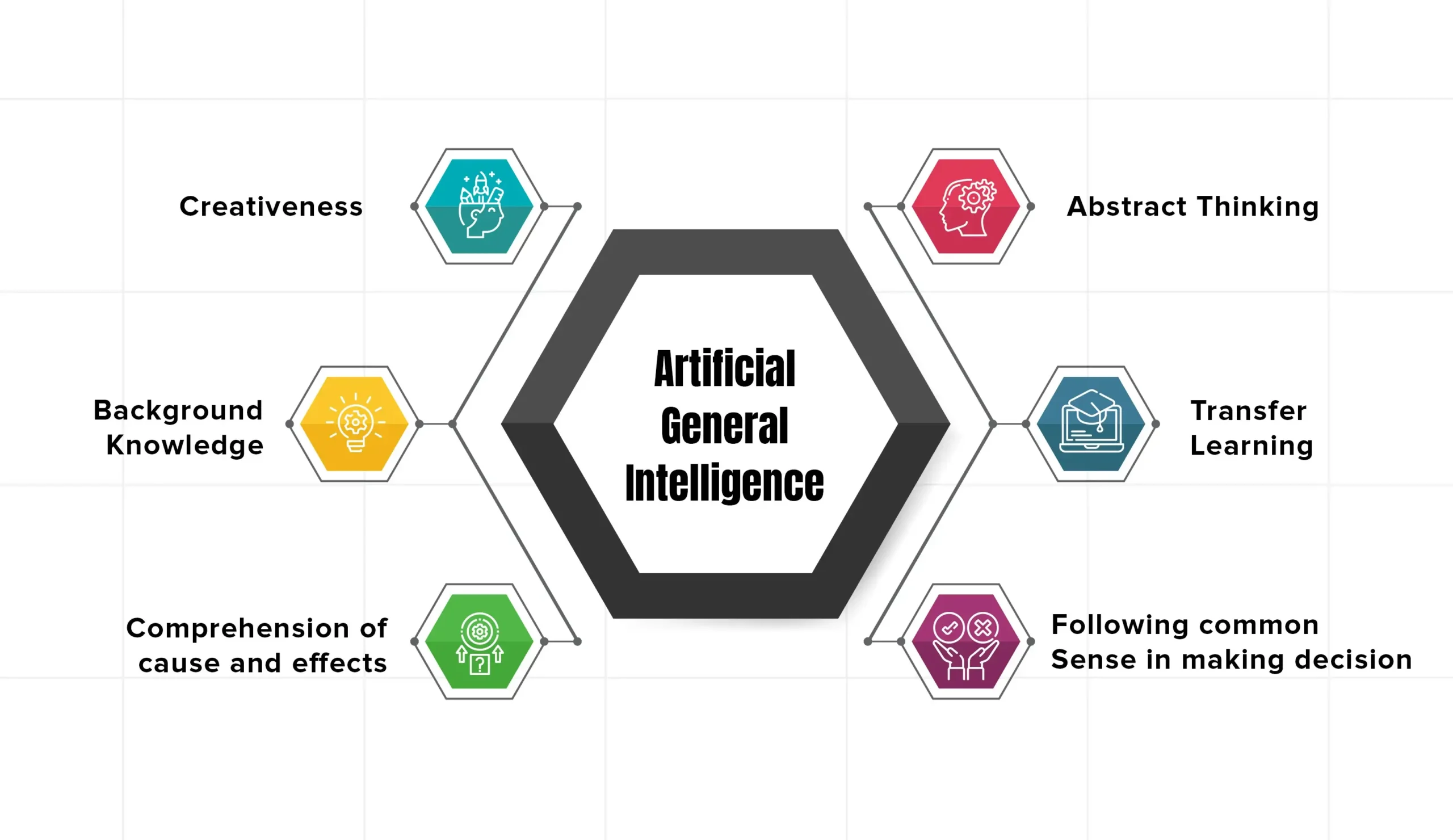AGI, a theoretical AI form, aims to replicate human cognitive abilities, enabling it to perform tasks similar to human ones. It goes beyond narrow AI, generalizing intelligence to any problem. OpenAI and DeepMind are working on AGI, aiming to pass the Turing Test. While theoretical, AGI represents a significant shift in understanding intelligence and could have profound implications for society and the economy.
Artificial General Intelligence Work
Artificial General Intelligence, is a form of AI that can understand, learn, and apply knowledge across various tasks and domains, much like a human. It can learn from experience, generalize knowledge, self-improve without human intervention, operate independently, and possess cognitive abilities comparable to humans. Researchers are exploring various approaches, such as advanced neural networks, deep learning, and computational neuroscience, to create AGI systems that can self-teach and solve complex problems.
- Learning and Adaptation: Instead of only carrying out pre-programmed tasks, AGI systems would be built to absorb knowledge from experience and adjust to novel circumstances.
- Generalization: Artificial general intelligence (AGI) may apply information from one domain to another, indicating a broad understanding of multiple subjects, in contrast to narrow AI.
- Self-Improvement: Without human assistance, AGI could enhance its own algorithms and overall performance.
- Autonomy: It would be able to function on its own, making choices and finding solutions without requiring particular instructions for every activity.
- Cognitive Abilities: Reasoning, planning, and problem-solving are among the cognitive skills that AGI might be able to do on par with humans.
How close are we to developing AGI?
Experts disagree on the degree to which artificial general intelligence (AGI) has been achieved, and the process of developing AGI is intricate and continuous. The present status of AGI development can be summed up as follows:
- OpenAI’s perspective: The development of AGI should proceed gradually, using dimmer versions of the technology to allow them to adjust and learn. They stress how crucial it is to be ready for both the possible advantages and hazards of AGI.
- Perspective of DeepMind: DeepMind has put out a novel paradigm for categorizing the abilities and behaviors of AGI. They talk about the disagreement over when artificial general intelligence (AGI) will manifest; some researchers perceive “sparks of AGI” in the big language models that exist today, while others predict AGI will appear in ten years.
- Forbes Insight: With a 25% likelihood of reaching human-like AI by 2030, Forbes believes that the next ten years are critical for the development of AGI.
- Analytics Vidhya: With innovations like GPT-4 and AlphaGo, major players like DeepMind, Anthropic, and OpenAI are actively advancing AI towards AGI. But there are still obstacles to overcome and restrictions to deal with.
Even though the discipline has made great strides, it is still unclear when exactly AGI will be developed. While advances in technologies such as GPT-4 and AlphaGo are encouraging, we are still a long way from reaching artificial general intelligence (AGI) capable of cognitive functions comparable to those of humans in all fields. Although everyone agrees that we are making progress, it might take several more years or even decades to reach the milestone of artificial general intelligence (AGI).
What are Some Challenges in Achieving AGI?
AGI development faces numerous challenges, including handling complex data sets, ensuring safety and reliability, fostering common sense and understanding, addressing ethical and social issues, combating bias, navigating regulatory and governance questions, and defining AGI. These systems require a multidisciplinary approach, involving AI researchers, ethics, policy, and law experts to create AI systems that benefit humanity while minimizing risks and negative impacts. AGI systems must be able to learn from experience, transfer knowledge across domains, and demonstrate reasoning and problem-solving skills akin to humans. Ultimately, AGI systems must navigate human language and social norms, ensuring a fair and inclusive future for humanity.







